The Summer of Arthur C. Clarke: The Rama Sequels
Before I begin, welcome to my Summer of Arthur C. Clarke. On the heels of last year's popular Slasher Summer, this year I'm leaving behind the guilty pleasure of the niche horror genre and exploring something a little closer to my own heart: namely science-fiction. Of all the sci-fi greats, none have influenced me more than the late Arthur C. Clarke, my personal favorite of the "Big Three" from the Golden Age of the genre (Asimov, Clarke, and Heinlein). This summer, I am going to look at a few of his most famous works, including the entirety of his 2001 series and the tiny handful of adaptations that have been made for film, television, and video games. Strap in and prepare yourselves for a journey into the stars and the mind, and let us never forget how much richer the world of fiction is for having been blessed by the incomparable Sir Arthur C. Clarke.
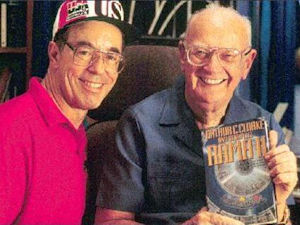 | | Lee's the one on the left, and if you don't know who the guy on the right is, what are you doing here? |
The Ramans do everything in threes. The closing sentence of Rendezvous with Rama hints--nay, promises--that more is on the way for Clarke's enigmatic masterpiece. Despite having no intention of continuing the story, Clarke was approached by a scientist who was chief engineer on the Galileo project for over a decade, Gentry Lee, who had an idea for the Ramans' inevitable return. True to form, what followed was not one sequel, but three, an epic trilogy centered mostly on Nicole des Jardins, one of the lucky people chosen to rendezvous with the second cylindrical visitor from the stars and who accidentally hitches a ride to wherever it goes next, maybe even to the Ramans themselves.
As I laid the groundwork for this summer's exercize, I read these sequels for the first time. I'd heard from many that the Gentry Lee books aren't as good as the original, that they might even ruin one's enjoyment of it. While I wouldn't wholly agree with that assessment, I can admit that it was a mistake to read them immediately after reading Rendezvous with Rama. Jumping into them so quickly is like hopping into an enormous pool right after soaking in a cozy hot tub; the pool might be the nicest pool in the world, but it will still feel shockingly cold and hostile after the warmth and comfort of the much smaller spa. My recommendation to those curious about these sequels is to wait; let the first book hang back in your memory for a while before starting Rama II. This tempering period could make all the difference between despising the sequels and adoring them.
|
RAMA II
| 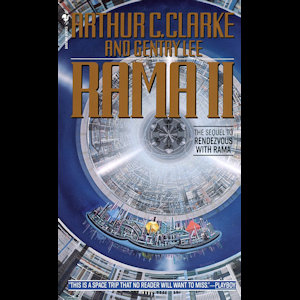 |
|
RAMA II
|  |
Written by Gentry Lee from a general outline by--and frequent input from--Arthur C. Clarke, Rama II is a drastic shift in tone, style, and approach from Clarke's original Rendezvous with Rama. It spends a considerable amount of time essentially rebooting the universe so it feels more contemporary, using a massive economic collapse as a plot device that does away with all of the extraterrestrial colonies and social progress of Clarke's future vision. As such, Rama II feels like something that could happen in the very near future, although its conception of social issues is set pretty firmly in late eighties sensibilities. This is hard enough to forgive, but the sequel also tones down Clarke's hard sci-fi, choosing instead to focus almost exclusively on character and plot.
Fans of the original Rama would do well to consider Rama II a very different beast. As long as one reads it expecting a more conventional sci-fi adventure--at times even a bit cliché--it's an entertaining ride that takes its time to explore modern issues of racism, spirituality, and greed. Granted, Lee's writing style can be infuriatingly meandering at times; his characters are a bit too black-and-white; and the things he adds to the Rama mythos don't feel as alien, as original, or as interesting as Clarke's original vision. However, it's got its charms, and Lee's less utopic view of humanity's future sociology feels more realistic than Clarke's familiar obsession with losing religion and wholly embracing scientific, empirical curiosity over all else.
Rama II is better at carefully crafting characters, creating conflict, and building tension, but readers hoping for a true follow-up to Rendezvous with Rama are bound to be disappointed.
|
THE GARDEN OF RAMA
| 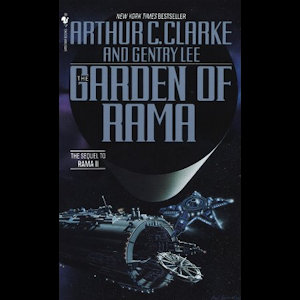 |
|
THE GARDEN OF RAMA
|  |
Despite a strong start and finish, The Garden of Rama is a chore to get through. Whether it's Nicole's long dream sequences, Lee's abstract descriptions that aren't as coherent as Clarke's much simpler ones, or the exhausting moment where we digress from the main characters and spend a couple hundred pages being introduced to dozens of new people and their intricate backstories (very few of which actually pay off), The Garden of Rama is a book in desperate need of editing and redirection. The climax, which comes on very suddenly, salvages what would otherwise be an exceptionally boring experience I wouldn't recommend.
Also, there's a point where a thirteen year old girl marries a seventy-two year old man, and it's played as a perfectly normal, not at all morally abhorrent thing. That's pretty messed up.
|
RAMA REVEALED
| 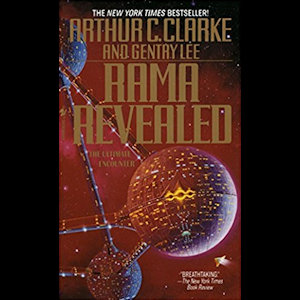 |
|
RAMA REVEALED
|  |
The best of Lee and Clarke's trilogy of Rama sequels, Rama Revealed seems to have learned from the previous books' mistakes. Largely gone are meandering backstories, tiresome dream sequences, and excessive digressions, as this book keeps a laser-like focus on a handful of characters and how they finally wrap up the story started in Rama II. While the actual reveal of who the Ramans are is a bit disappointing (and is delivered almost as an afterthought in the final pages), this book shines in its intricate descriptions of alien life and culture by way of the octospiders, an incredibly fascinating sci-fi creation that winds up being more interesting than Rama itself.
This final novel also has emotional resonance that the previous books lacked, and as it nears its conclusion, a lot of the fat from Lee's previous efforts can be forgiven. Granted, there are some lingering mysteries that are left unaddressed, but what it lacks in the titular reveal, the novel makes up for by giving us a satisfying resolution to the characters and events of all three books.
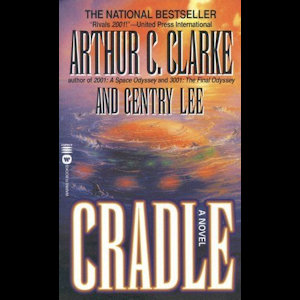 | | If you like the Lee/Clarke collaborations, maybe check out their first: Cradle |
Ultimately, the Rama sequels are entertaining and interesting, though they aren't nearly as good as Clarke's original and aren't particularly important when considering Clarke's larger science-fiction career. Clarke's original vision of the future is subverted in a lot of ways to provide a more traditional setting and a more traditional narrative, and Lee wildly overcompensates for Clarke's inattention to character detail by offering far, far too much of it. Still, Clarke did learn a few things from Lee, I think, and his own characters moving forward do tend to have richer and more elaborate backstories.
As for Rama, the sequels offer several new layers to the mythos. Some aren't particularly satisfying, but others open up whole new worlds of ideas and concepts to explore. Rama purists can content themselves to consider the sequels non-canon if they choose, leaving the mystery open-ended, but anyone who wants more can do a heck of a lot worse than read what Lee and Clarke have cooked up here. Just, you know, keep those expectations tempered.
There are two more books in the series, two pseudo-sequels written entirely by Lee without Clarke's input: Bright Messengers and Double Full Moon Night. In the interests of full disclosure, I have not read them, and the reviews I have found tend to fall somewhere between mixed and scathing, even for fans of the Rama II trilogy. If I ever get around to checking them out--I don't really intend to, but it could happen--I'll be sure to offer my thoughts here. For now, though, get ready to explore Rama in an entirely new medium. Next week, the Solo Gamer will take over and review an obscure point-and-click PC adventure game from the 1990's titled simply RAMA.
-e. magill 7/19/2018
THE UNAPOLOGETIC GEEK'S
SUMMER OF ARTHUR C. CLARKE: | |
|
|
|